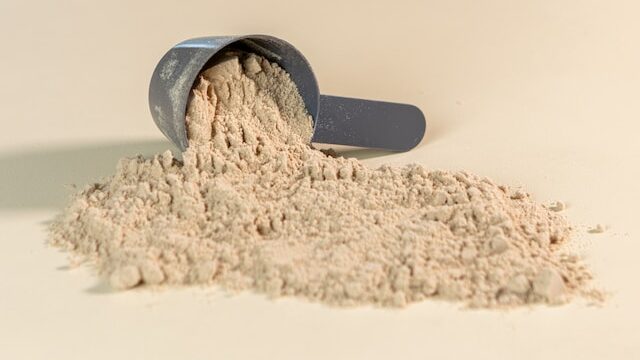Protein powder is an essential supplement for anyone looking to build muscle and enhance their workouts. It provides the necessary amino acids that our bodies need to repair and grow muscle tissue. In this article, we’ll delve deep into the world of protein powders, their benefits, types, and how to choose the right one for muscle building.
Table of Contents
Key Takeaways:
- Protein powder is a vital supplement for muscle growth and recovery.
- There are various types of protein powders, each with its unique benefits.
- It’s essential to choose the right protein powder based on your dietary needs and workout regimen.
- Incorporating protein powder into your diet can accelerate muscle growth and improve workout performance.

Why Protein Powder is Essential for Muscle Building
The Role of Protein in Muscle Growth
Protein is the building block of muscles. When we work out, we create tiny tears in our muscle fibers. These tears are then repaired by the body using amino acids, the building blocks of protein. This repair process leads to muscle growth. Consuming adequate protein ensures that the body has enough amino acids for this repair process.
Benefits of Protein Powder
- Quick Absorption: Protein powders, especially whey, are quickly absorbed by the body, making them ideal post-workout.
- Convenience: It’s an easy way to increase protein intake without consuming large amounts of food.
- Versatility: Can be added to smoothies, oatmeal, or just mixed with water or milk.
Types of Protein Powders
Whey Protein
Derived from milk, whey protein is one of the most popular protein powders. It’s rich in essential amino acids and is quickly absorbed by the body.
- Benefits: Boosts muscle growth, enhances recovery, and supports immune function.
- Who should use it: Those who are not lactose intolerant and are looking for a fast-absorbing protein source.
Casein Protein
Also derived from milk, casein is absorbed more slowly than whey, providing a steady release of amino acids.
- Benefits: Supports muscle recovery during sleep and helps in feeling full.
- Who should use it: Those looking for a slow-releasing protein source, ideal for nighttime.
Plant-Based Proteins
These proteins are derived from plants and are ideal for vegans and vegetarians. Examples include pea protein, hemp protein, and soy protein.
- Benefits: Contains essential amino acids, suitable for those with dairy allergies or lactose intolerance.
- Who should use it: Vegans, vegetarians, and those allergic to dairy.
How to Choose the Right Protein Powder
When selecting a protein powder, consider the following:
- Dietary Needs: Ensure the protein powder aligns with any dietary restrictions or preferences.
- Protein Content: Look for powders with a high protein content per serving.
- Taste and Mixability: A good protein powder should taste good and mix well without clumping.
Incorporating Protein Powder into Your Diet
To get the most out of your protein powder:
- Consume it post-workout for quick muscle recovery.
- Mix it with water, milk, or in a smoothie.
- Ensure you’re also consuming a balanced diet with whole foods.
Protein Powder Facts: A Quick Glance
| Type | Source | Protein per Serving | Best For |
|---|---|---|---|
| Whey Protein | Milk | 24g | Post-workout recovery |
| Casein Protein | Milk | 20g | Nighttime recovery |
| Pea Protein | Yellow Peas | 21g | Vegans and vegetarians |
- For more detailed information on protein types, visit 7 best types of protein powder
More on Muscle Building
Muscle building is not just about consuming protein. It’s a combination of consistent workouts, a balanced diet, and adequate rest. Protein powder is just one tool in the arsenal.
The Science Behind Protein Synthesis
Protein synthesis is the process by which cells construct proteins. For muscle builders, this process is crucial as it dictates how effectively our muscles recover and grow after a workout.
Factors Affecting Protein Synthesis
- Exercise: Resistance training, in particular, stimulates muscle protein synthesis.
- Nutrition: Consuming protein, especially post-workout, boosts protein synthesis rates.
- Hormones: Insulin and testosterone play roles in regulating protein synthesis.
Optimal Protein Intake for Muscle Building
While protein powders are beneficial, it’s essential to understand the optimal protein intake for muscle growth.
Daily Protein Requirements
- Sedentary adults: 0.8g per kilogram of body weight.
- Athletes and bodybuilders: 1.2g to 2.2g per kilogram of body weight.
Timing Matters
Consuming protein post-workout can enhance muscle recovery and growth. A protein shake within 30 minutes of your workout can be beneficial.

Frequently Asked Questions
1. Can I build muscle without protein powder?
Yes, while protein powder is a convenient source of protein, you can obtain protein from whole foods like chicken, fish, eggs, and legumes. It’s the total daily protein intake that matters most.
2. Are there side effects to consuming protein powder?
When consumed in moderation and as part of a balanced diet, protein powder is generally safe. However, excessive intake can lead to digestive issues. Always consult with a healthcare professional before starting any supplement.
3. Is plant-based protein as effective as whey protein?
Plant-based proteins can be just as effective as whey protein when it comes to muscle building. The key is to ensure you’re getting a complete amino acid profile, which might require combining different plant-based sources.
4. How often should I consume protein powder?
This depends on your daily protein requirements and how much protein you’re getting from whole foods. Some people consume it daily, while others only on workout days.



